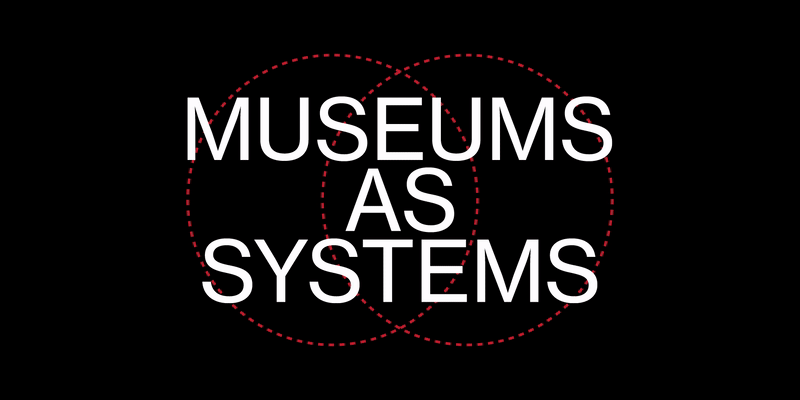Museums as Systems 2023
06.20.2023

Zoom
The two-day, annual Museums as Systems symposium gathers together arts workers to discuss alternative approaches to museum structures. The 2023 convening asks the question: what “resources" are necessary to reimagine the systems of museums?
This symposium explores “resources” through four key themes: love and care, creative fundraising, reclamation, and radical hospitality. Over four sessions, “Museums as Systems: Resources for Reimagination” seeks to explore these concepts with the following questions: What do we have? What do we need? How do we get it? What are we willing to risk? to give up? What are the barriers to broadening access and how can we overcome them? What are alternative solutions to acquiring the resources we need?
This program is free and open to all. ASL interpretation and closed captioning will be provided.

Museums as Systems II day one
Sessions
I. DEV 101: Thinking Outside the Bag, 5:30–6:45 pm EDT
This panel aims to spotlight how, through creative ingenuity, development departments play integral roles in ensuring the survival of institutions, art, and artists, at every level. “DEV 101: Thinking Outside the Bag” considers these questions: How can fundraising and development work build stronger ties with local communities? What are the skills necessary to do this work? How do we develop multiple entry points for people to become supporters and donors of institutions, while also acknowledging how integral people are to an institution's survival? In what ways should one approach development with imagination and creativity?
Moderator: McKenzie Grant-Gordon
Panelists: Lisa Dent with Alayah Glenn
II. Access and Accessibility as an Act(ion) of Radical Hospitality, 7:00–8:15 pm EDT
This panel offers the perspectives and tactics of art workers and artists who are willing to go beyond tokenizing accessibility and who instead promote a rich, expansive form of equity. “Access and Accessibility as an Act(ion) of Radical Hospitality” asks: How can we increase access to institutions? Where can we be more open via spatial/physical, programmatic, or design considerations? Can institutions think expansively about how people engage with their virtual and in-person spaces?
Moderator: isa saldaña
Panelists: Joselia Rebekah Hughes with Madison Smith
Museums as Systems is generously funded by a grant from the Llewellyn Family Foundation. The Studio Museum in Harlem’s Learning and Engagement programs are supported by the Thompson Foundation Education Fund; William R. Kenan, Jr. Charitable Trust; Con Edison; Harlem Community Development Corporation; May and Samuel Rudin Family Foundation; and Joseph and Joan Cullman Foundation for the Arts. Additional support provided by the New York City Department of Cultural Affairs and New York State Council on the Arts.
Museums as Systems 2023
06.20.2023

Zoom
The two-day, annual Museums as Systems symposium gathers together arts workers to discuss alternative approaches to museum structures. The 2023 convening asks the question: what “resources" are necessary to reimagine the systems of museums?
This symposium explores “resources” through four key themes: love and care, creative fundraising, reclamation, and radical hospitality. Over four sessions, “Museums as Systems: Resources for Reimagination” seeks to explore these concepts with the following questions: What do we have? What do we need? How do we get it? What are we willing to risk? to give up? What are the barriers to broadening access and how can we overcome them? What are alternative solutions to acquiring the resources we need?
This program is free and open to all. ASL interpretation and closed captioning will be provided.

Museums as Systems II day one
Sessions
I. DEV 101: Thinking Outside the Bag, 5:30–6:45 pm EDT
This panel aims to spotlight how, through creative ingenuity, development departments play integral roles in ensuring the survival of institutions, art, and artists, at every level. “DEV 101: Thinking Outside the Bag” considers these questions: How can fundraising and development work build stronger ties with local communities? What are the skills necessary to do this work? How do we develop multiple entry points for people to become supporters and donors of institutions, while also acknowledging how integral people are to an institution's survival? In what ways should one approach development with imagination and creativity?
Moderator: McKenzie Grant-Gordon
Panelists: Lisa Dent with Alayah Glenn
II. Access and Accessibility as an Act(ion) of Radical Hospitality, 7:00–8:15 pm EDT
This panel offers the perspectives and tactics of art workers and artists who are willing to go beyond tokenizing accessibility and who instead promote a rich, expansive form of equity. “Access and Accessibility as an Act(ion) of Radical Hospitality” asks: How can we increase access to institutions? Where can we be more open via spatial/physical, programmatic, or design considerations? Can institutions think expansively about how people engage with their virtual and in-person spaces?
Moderator: isa saldaña
Panelists: Joselia Rebekah Hughes with Madison Smith
Museums as Systems is generously funded by a grant from the Llewellyn Family Foundation. The Studio Museum in Harlem’s Learning and Engagement programs are supported by the Thompson Foundation Education Fund; William R. Kenan, Jr. Charitable Trust; Con Edison; Harlem Community Development Corporation; May and Samuel Rudin Family Foundation; and Joseph and Joan Cullman Foundation for the Arts. Additional support provided by the New York City Department of Cultural Affairs and New York State Council on the Arts.
Zoom